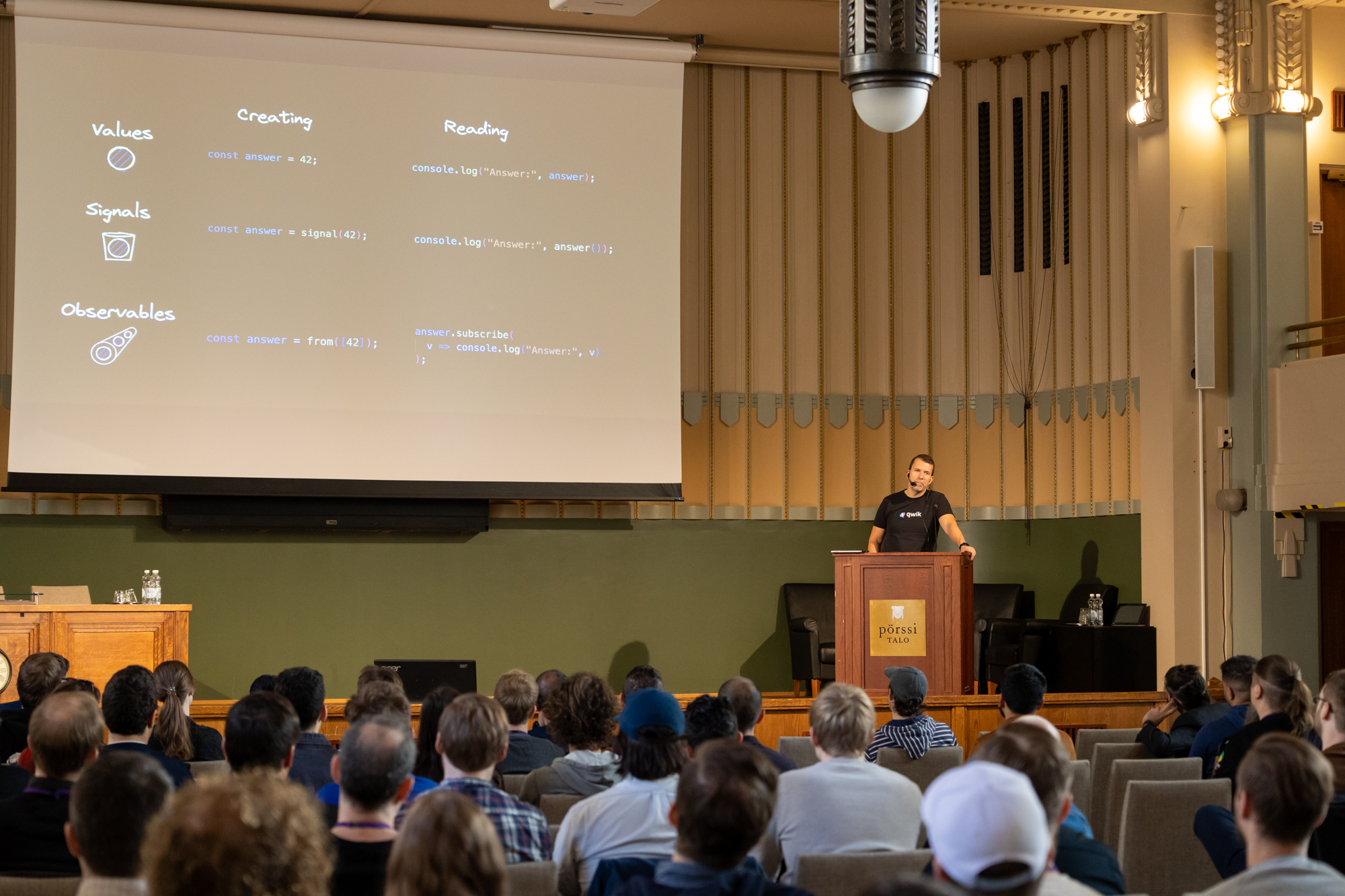Efficiency in the Frontline: Key Takeaways from Future Frontend 2023
The Future Frontend 2023 conference, formerly known as React Finland, took place from June 6th to June 9th, 2023. The event featured two workshop days, followed by two conference days. Knowit sponsored the conference alongside Gofore, Elisa, and Alma, highlighting Knowits support and commitment to advancing frontend development.
Knowit participated in the conference with a dedicated team of seven consultants. Our team brought a wealth of expertise and enthusiasm to the event, engaging with fellow attendees, speakers, and industry professionals. Additionally, one of our team members actively participated in the workshops, gaining valuable insights and hands-on experience in designer/developer workflow. Here’s their thoughts on the workshop:
The goal of Tuesday's workshop was to strengthen the working relationship between developer and designer. It turns out that both parties face similar challenges and the skills used to solve them aren't that different. Both designers and developers work with dynamic tools and exhibit analytical thinking, creative problem solving, and a desire to create reusable patterns. Through empathy we can better understand each other’s efforts, and work together to solve shared challenges like how to name components.
.jpg?width=6240&height=4160&name=Yleinen%20(2).jpg)
The Future Frontend 2023 conference showcased a diverse range of presentations, covering various aspects of frontend development and emerging technologies. Prominent industry experts and thought leaders shared their knowledge, insights, and best practices with the attendees. From innovative design patterns to cutting-edge frameworks, the conference offered a glimpse into the future of frontend development. The following were some of the key highlights that captivated the audience.
Comparison of Reactivity Across Frameworks
The conference kicked off with an insightful presentation by Miško Hevery, the creator of Qwik and Angular. He delved into the topic of reactivity in various JavaScript frameworks, setting the stage for the subsequent presentations throughout the event. The presentation delved deep into the inner workings of popular frameworks and explored their ability to efficiently refresh the browser's DOM with minimal computational effort and complexity.
The main takeaway from the presentation was the importance of achieving optimal reactivity in frontend development. By efficiently updating the DOM in response to data changes, developers can ensure smooth user experiences and seamless interactions. Miško Hevery emphasized the need for frameworks to strike a balance between computational efficiency and simplicity, as excessive complexity can hinder performance and developer productivity.
 Slides from Miškos presentation: Slides
Slides from Miškos presentation: Slides
Follow Miško on Twitter: @mhevery
Universal design systems
In the fast-paced world of UX/UI design, creating a seamless user experience across various platforms is essential for the success of any application. Thaís Santos and Mohammad Khazali delved into the significance of universal design systems and how they can help apps adapt to different platforms while maintaining brand identity.
One of the key takeaways from the discussion was the importance of consistency in brand elements such as colour schemes, spacing, roundness, and iconography. Regardless of the platform, these defining characteristics should remain unchanged, providing users with a sense of familiarity and strengthening brand recognition.
However, while maintaining consistency is crucial, it is equally important to leverage users’ existing familiarity with standard UI patterns on their respective platforms, such as search, navigation and typography (San Francisco for iOS and Roboto for Android), reducing cognitive load and enhancing usability.
.jpg?width=6240&height=4160&name=universal%20design%20system%20(2).jpg)
Slides from Mohammads presentation: Slides
Follow Mohammad on LinkedIn: LinkedIn
Slides from Thaís’ presentation: Slides
Follow Thaís on Twitter: @th4is_ds
Green computing
Green computing, a central theme of the conference, was further highlighted in an engaging presentation by Satu Lapinlampi and Janne Kalliola. Their insightful session shed light on the detrimental effects of inefficient and unused code on the environment, emphasizing the need for sustainable coding practices.
Satu mentioned the Code from Finland Association which includes almost 250 companies and communities. The Code from Finland mark helps one to recognise software products and services provided from Finland. Any member of the association can apply for a carbon neutrality symbol if they calculate their own carbon footprint annually according to the methods generally used in the industry and offset their carbon footprint at least annually using one or more well-proven compensation mechanisms.
In summary, Satu’s and Janne's presentation emphasized the critical role of green computing in mitigating the environmental impact of software development. The audience was reminded that the responsibility to embrace green coding practices lies with both individual developers and the software development community as a whole. By adopting sustainable coding techniques, such as code optimization, efficient algorithms, and responsible resource management, we can collectively contribute to a greener and more environmentally conscious technology sector..jpg?width=2000&height=1333&name=green%20coding%20(3).jpg)
Slides from Satu’s and Janne’s presentation: Slides
Follow Satu on LinkedIn: @SatuLap
Follow Janne on Twitter: @plastic
To summarize...
In conclusion, the Future Frontend conference was a resounding success, providing an exceptional platform for learning, networking, and exploring the latest trends in frontend development. The conference boasted a vibrant atmosphere, featuring engaging presentations and a diverse range of attendees, with more than half coming from countries beyond Finland.
As the first event with the new name and concept, the organizers demonstrated their commitment to excellence. We are eagerly anticipating future editions of the Future Frontend conference (pun very much intended 😊), confident that they will build upon this already impressive foundation.
Our team at Knowit thoroughly enjoyed the conference, engaging with fellow professionals and gaining invaluable knowledge. Our active participation reaffirmed our dedication to advancing frontend development and staying at the forefront of industry innovations. We look forward to continued collaboration and growth within the frontend community.
Interested in Knowit? Take a look at our open positions:



